
Human, All Too (Post)Human: The Humanities after Humanism
(Hardback)
Publishing Details
Human, All Too (Post)Human: The Humanities after Humanism
By (Author) Jennifer Cotter
Edited by Kimberly DeFazio
Edited by Robert Faivre
Edited by Amrohini Sahay
Edited by Julie P. Torrant
Edited by Stephen Tumino
Edited by Robert Wilkie
Bloomsbury Publishing PLC
Lexington Books
2nd June 2016
United States
Classifications
Professional and Scholarly
Non Fiction
Sociology
304.5
Physical Properties
Hardback
252
Width 160mm, Height 234mm, Spine 24mm
535g
Description
The contemporary has marked itself off from modernity by questioning its humanism that centers the world around the human as the moral subject of free will and self-determination, the bearer of universal essence that is the basis of human rights. Modernism normalizes humanism through language as referential, a set of interrelated signs that correspond to the empirical reality outside it. Humanist modernity, in other words, is seen in the contemporary as a regime that, by separating the human from the non-human and insisting on language as correspondence, not only fails to engage the emerging forms of social relations in which the boundaries of human and machine are fading but is also indifferent to the difference between the others life and other lives. Human, All Too (Post)Human: The Humanities after Humanism argues that the Nietzschean tendencies that provide the philosophical boundaries of post-humanism do not undo humanism but reform it, constructing a parallel discourse that saves humanism from itself. Grounded in materialist analysis of social life, Human, All Too (Post)Human argues that humanism and post-humanism are cultural discourses that normalize different stages of capitalismanalog and digital capitalism. They are different orders of property relations. The question, the writers argue, is not humanism or post-humanism, namely cultural representations, but the material relations of production that are centered on wage labor. Language, free will, or human rights are not the issues since Right can never be higher than the economic structure of society and its cultural development conditioned thereby. The question that shapes all questions, in Human, All Too (Post)Human is freedom from (wage) labor.
Reviews
Human, All Too (Post)Human is the culmination of some extraordinary and necessary work produced over the last 20 years. . . . The authors argue convincingly that the recent theory emerging from neoliberalism obscures history, materiality, and class relations. * Science & Society *
Human, All Too (Post)Human is an uncommon book; it is a philosophically insightful and erudite analysis of the contemporary situation with deep political commitment to social change. It is a piercing root critique of governing ideas and the social conditions that produce them at a time when critique itself has become the target of accommodationist thinkers such as Bruno Latour in order to sideline such un-assembling of the social. Written against the horizon of Marxs Critique of the Gotha Program, Human, All Too (Post)Human, breaks the silence on what has become unspeakable in contemporary cultural critique and argues not for freedom from humanism or post-humanism, which have haunted bourgeois thought, but for a future free from wage labor. -- Peter McLaren, Honorary Chair Professor and Director of the Center for Critical Studies, Northeast Normal University, China
Author Bio
Jennifer Cotter is associate professor of English at William Jewell College. Kimberly DeFazio is associate professor of English at the University of Wisconsin, La Crosse. Robert Faivre is professor of English at SUNY Adirondack. Amrohini Sahay is assistant professor of English at Hofstra University. Julie P. Torrant is assistant professor of English at Kingsborough Community College. Stephen Tumino is adjunct assistant professor of English at the Borough of Manhattan Community College (CUNY). Rob Wilkie is associate professor of English at the University of Wisconsin, La Crosse.
